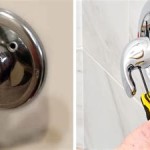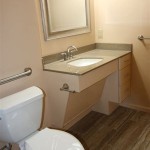How To Fix Sewer Smell In Bathroom
A persistent sewer smell in the bathroom is not only unpleasant but can also indicate underlying plumbing issues. Addressing the problem quickly is crucial to maintain a hygienic and comfortable environment. This article outlines common causes of sewer gas odors and provides practical solutions for homeowners.
Understanding the Source
Sewer gas is primarily composed of methane, hydrogen sulfide, and ammonia, produced by the decomposition of organic matter in the sewer system. Plumbing fixtures utilize traps, U-shaped bends in the pipes filled with water, to create a barrier preventing these gases from entering the bathroom. A dry trap, a broken seal, or a venting problem can allow sewer gas to escape, causing the foul odor.
1. Check for Dry P-Traps
Infrequently used fixtures like guest bathroom sinks, showers, or floor drains can have their P-traps dry out due to evaporation. Pouring a cup of water down the drain periodically will replenish the water barrier and prevent sewer gas from escaping. This is often the simplest and most effective solution for occasional sewer smells.
2. Inspect the Toilet Seal
A faulty wax ring seal at the base of the toilet is a common culprit for sewer smells. The wax ring creates an airtight seal between the toilet and the drainpipe. If the wax ring is cracked, damaged, or improperly installed, sewer gas can escape into the bathroom. Replacing the wax ring necessitates removing the toilet, so if this task is outside one's comfort zone, contacting a plumber is recommended.
3. Examine the Shower Drain
Similar to other fixtures, shower drains have P-traps that can dry out, particularly in infrequently used showers. Pouring water down the drain can resolve this issue. However, if the smell persists, the drainpipe itself might be clogged with hair or other debris, hindering proper drainage and allowing sewer gas to escape. Cleaning the drain with a drain snake or chemical drain cleaner can often resolve this problem.
4. Investigate the Vent System
Plumbing vent pipes extend through the roof and regulate air pressure within the drainage system. A properly functioning vent system allows wastewater to flow freely and prevents pressure changes that can draw water out of P-traps. A blocked vent pipe, often caused by debris, bird nests, or ice buildup, can disrupt this balance and lead to sewer gas odors. Inspecting and clearing the vent pipe might require professional assistance.
5. Addressing Cracked Pipes or Loose Connections
Cracks in drainpipes or loose connections between pipes can also release sewer gas. These issues can be more challenging to identify, often requiring a thorough inspection of the plumbing system, possibly including the use of a camera inspection. Repairing cracked pipes or tightening loose connections generally necessitates the expertise of a qualified plumber.
6. Check the Floor Drain
Floor drains, particularly in basements or older bathrooms, can be another source of sewer smells. Similar to other drains, their P-traps can dry out, allowing sewer gas to escape. Regularly pouring water down the floor drain can prevent this. If the smell persists, the drain might be clogged or the drainpipe itself might be damaged, requiring cleaning or repair.
7. Consider Bio-Drain Cleaners
If drain cleaning doesn't eliminate the odor, a buildup of biofilm inside the pipes might be contributing to the problem. Biofilm is a slimy layer of bacteria that can accumulate in drains and produce unpleasant odors. Bio-drain cleaners utilize enzymes or bacteria to break down biofilm and eliminate the source of the smell. These cleaners are generally environmentally friendly and can be used as a preventative measure.
8. Inspect the Ventilation Fan
While not directly related to the sewer system, a malfunctioning bathroom ventilation fan can exacerbate existing sewer smells by failing to remove moisture and odors effectively. Ensuring the fan is functioning correctly and cleaning or replacing it if necessary can improve overall bathroom air quality.
9. Check for Leaks
Sometimes, a sewer smell might be mistaken for a musty odor caused by a hidden leak. Thoroughly inspect the bathroom for any signs of water damage, including dampness, discoloration, or mold growth. Addressing any leaks promptly can resolve the odor and prevent further damage.
Professional Assistance
While several solutions can be implemented by homeowners, some situations necessitate the expertise of a licensed plumber. If the sewer smell persists after attempting the above solutions or if identifying the source of the problem proves challenging, contacting a professional is the best course of action. A plumber has the necessary tools and knowledge to diagnose and resolve complex plumbing issues effectively, ensuring a safe and odor-free bathroom environment.

Sewer Smell In Bathroom Solved Bob Vila

7 Causes Of A Sewer Smell In The Bathroom Hays

My Bathroom Smells Like A Sewer What Causes That And How Do You Fix It Kitchen Infinity

Why Does My Toilet Smell Like Sewage 5 Causes Solutions

How To Get Rid Of Sewage Smell In Your Bathroom Bond Cleaning Adelaide
My Bathroom Smells Bad But Only When Its Hot Outside It Also Will Slightly Go Away I Run The Sink And Toilet Bathtub Any Thoughts On What Is

What Causes A Sewer Smell In The Bathroom Make It Right

Sewer Smell In The Shower Misterfix It Com
Why Is There A Sewage Smell In Your Bathroom Howstuffworks

How To Clean A Stinky Sink Drain Home Repair Tutor
Related Posts







